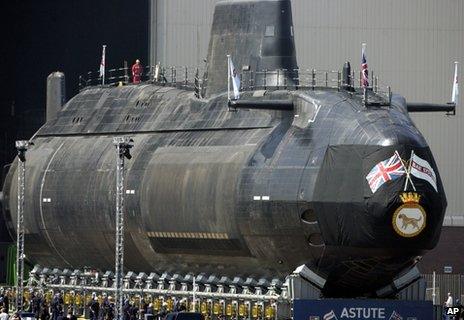BAE-EADS merger cancelled amid political impasse
- Published

BAE Systems is a major employer in the UK, with facilities at Barrow-in-Furness, Lancashire's Ribble Valley, and on the Clyde in Scotland
Aerospace and defence firms BAE Systems and EADS have decided to cancel their planned merger, after talks were thwarted by political deadlock.
It followed days of talks between the UK, French and German governments to overcome political objections.
The UK wanted its counterparts to agree to limit their influence in the merged firm in order to maintain BAE's strong working relations with the US Pentagon.
The BBC understands that Germany was fundamentally opposed to the deal.
"Once German intransigence became clear - as it did overnight - EADS and BAE had no option but to call the whole thing off," said the BBC's business editor, Robert Peston.
The move came ahead of a 17:00 BST regulatory deadline to close the deal.
"We are obviously disappointed that we were unable to reach an acceptable agreement with our various government stakeholders," said BAE chief executive Ian King, external.
In a letter to employees, EADS head Tom Enders said: "I'm ready to admit that we never expected to face such opposition against the deal, in particular not in Berlin.
"We will now take the time to clearly draw a number of lessons from this experience. We will need to review our group strategy and defence activities in particular."
BAE shares fell 2% in London trading as the news broke, while EADS shares jumped 3%.
Three-way talks
UK firm BAE and the Franco-German Airbus-owner EADS had to decide by shortly after the end of the London trading day on Wednesday whether to ask the Takeover Panel for an extension to their $45bn (£28bn) merger talks.
Only the French government has a direct stake in EADS.
Germany also exerts a high degree of control through the shareholding of German industrial group Daimler.
A spokesman for German Chancellor Angela Merkel said that, despite the failure of the merger, the government would continued talks with Daimler for the state-owned development agency KfW to buy out Daimler's remaining 15% stake.
The British government is able to veto any deal through its ownership of a "golden share" in BAE.
Defence Secretary Philip Hammond: "We wanted to see a reduction of the share holdings by governments"
The BBC's business editor noted that BAE's board had made it "an absolute condition for the transaction that the French and German governments should never own more than 9% each of the merged outfits, that they should not vote as a bloc and that they should not have representatives on the holding company board".
However, the key sticking point appears to have been the insistence by the UK government and the two company heads that directors appointed by the French, German and UK governments should not sit on the top board of the merged group.
This was needed in particular to address US qualms about possible foreign government influence over BAE. The US is BAE's biggest single customer, and the UK firm is involved in classified research and development projects for the US military.
Takeover target?
The deal would have created a European aerospace and defence giant comparable in size to Boeing of the US.
It was supposed to marry BAE's expertise in military and defence with EADS' aerospace juggernaut, Airbus, and was not simply aimed at cutting costs and employee numbers, according to an editorial authored by the two companies' bosses in defence of the deal, external.
It would have had combined revenues of £59bn and profits of £2.4bn. Its employees would have totaled 225,000. It would have brought BAE's strong presence in the US together with Airbus' booming business in the growth market of Asia-Pacific.
In their joint statement on Wednesday announcing the cessation of merger talks, the two reiterated: "The merger would have produced a combined business that would have been a technology leader and a greater force for competition and growth across both the commercial aerospace and defence sectors."
They said that full commercial details of the merger - including the legal structure, management and the logistics of combining the businesses - had already been fully worked out between the two of them before the politicians weighed in.
But the merger talks then became bogged down by wranglings between their respective governments after the deal became public on 12 September.
The UK government was thought to be broadly in favour of the deal, particularly as it would help to protect jobs at two factories in the UK, owned by EADS, that manufacture wings and other parts for Airbus planes.
It would also have helped BAE, which was suffering from defence spending cuts by the US and UK, its two main customers.
Our correspondent noted that a resurrection of the deal cannot be ruled out if France and, particularly, Germany lift their opposition in the future.
And although BAE is struggling in the face of US defence cuts, it is likely to be protected from takeover - at least by a foreign firm - by the UK government's veto.
The EADS boss, Tom Enders, said of possible future co-operation with his BAE counterpart Ian King that he was "sure there will be other challenges we'll tackle together in the future".
- Published10 October 2012
- Published10 October 2012
- Published10 October 2012
- Published10 October 2012
- Published8 October 2012
- Published7 October 2012